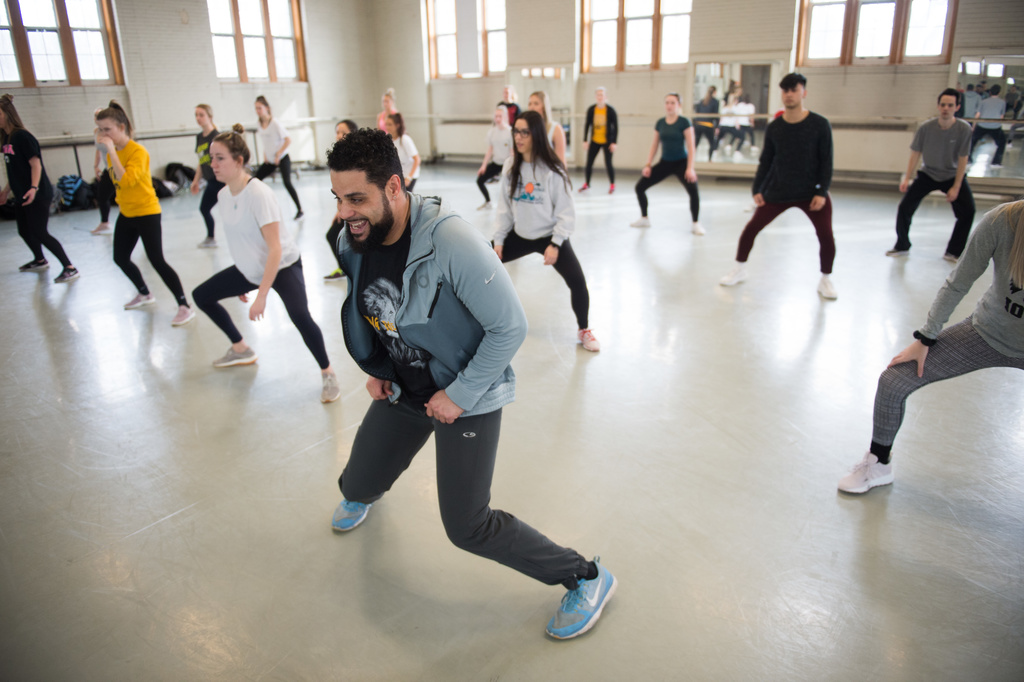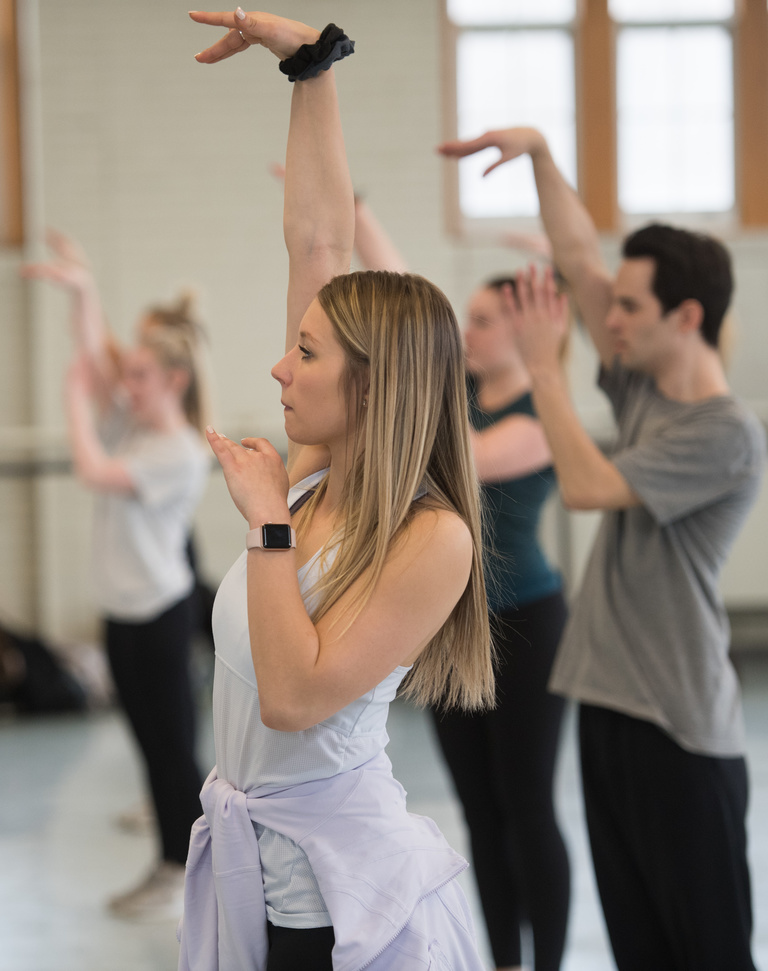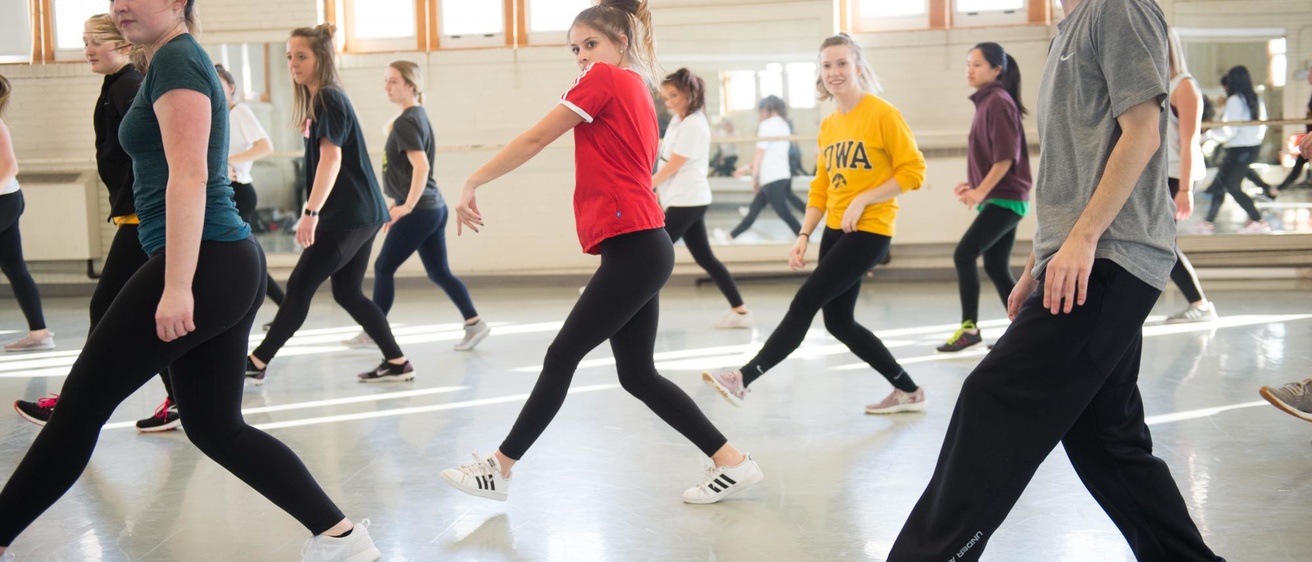Audience members for the October 2018 world premiere adaptation of Jane Austen’s Northanger Abbey at the University of Iowa’s E.C. Mabie Theatre likely didn’t know it, but they also saw the stage debut of the actor playing Captain Frederick Tilney.
Division of Performing Arts semester hours generated by nonmajor students 2017–18 academic year:
Department of Theatre Arts
2,727 semester hours completed by 978 nonmajor students (47 percent of total enrollment)
School of Music
5,856 completed by 1,762 nonmajor students (48 percent of total enrollment)
Department of Dance
2,098 completed by 1,106 nonmajor students (67 percent of total enrollment)
Jeremy Burling, a fifth-year student from Bloomington, Minnesota, majoring in industrial engineering, says he has always been interested in theater, but between classes and sports in high school, he never got the chance to be in the school play. A professor in the UI Department of Theatre Arts suggested he attend fall auditions.
“When I auditioned, it was the first time I ever acted,” Burling says. “I figured if I didn’t do it now, I would never do it. It’s so accessible here. And they encourage it, which is really cool about the University of Iowa.”
Burling’s story isn’t unique on the UI campus. The Division of Performing Arts is no stranger to students majoring in other subjects. Nonmajor students completed more than 10,000 semester hours in the School of Music and Departments of Dance and Theatre Arts during the 2017–18 academic year.
“We often see students who didn’t realize there are so many opportunities for non-music majors,” says Eric Bush, associate director of bands and director of the Hawkeye Marching Band. “We’re able to find a place in music for anybody majoring in anything at Iowa. Students are always pleasantly surprised.”
That goes for dance and theater as well, with auditions and many classes open to any UI student.
The reasons students participate in the performing arts are as varied as their majors. Some, like Burling, want to try something new; they may not have had the time to get involved in a theater production, join a choir, or take a dance class. For others, these experiences simply may not have been accessible.
“It requires a lot of effort, money, and familial support to study dance as a child,” says Rebekah Kowal, associate professor of dance and chair of the Department of Dance. “Our art form has a barrier to entry that is definitely economic. Students who have not had access to dance experience or dance training can find it here. That’s something I feel really good about.”
For many students who participated in the performing arts before coming to the UI, the opportunity to continue was a factor when choosing a college.

Michael Janssen picked up his first instrument in the fifth grade. When the Cedar Rapids, Iowa, native began looking at colleges, he not only looked at their engineering programs but also their music offerings. In fact, he decided not to apply to one university because it didn’t have a music program.
“It had a great engineering school, but I had to weigh that against the lack of a music program,” Janssen says. “The fact that they didn’t have a music program made me think it wouldn’t be a good fit.”
Janssen is now in his fourth year at the UI, having switched his major to business management. He is a section leader for mellophones in the Hawkeye Marching Band, plays French horn in concert band, and is president of the UI chapter of Phi Mu Alpha Sinfonia, a men’s music fraternity.
“For a lot of us, music is something we love to do,” Janssen says. “For me, it’s also stress relief. I find comfort in creating music. There’s also a natural high that comes with performing in front of a crowd. Being able to perform in front of 70,000 people at Kinnick Stadium is a unique experience and one I would never give up.”
Elena Koufis, a second-year student from Palatine, Illinois, has been dancing her whole life. She hasn’t decided on a major—she’s leaning toward communications—but like Janssen, she says she finds joy in staying connected to her art.
“I knew dance was definitely something I wanted to continue, whether through taking classes or dance club,” Koufis says. “It’s a great de-stressor. I have a bunch of rigorous courses, but then I can go to dance class and be in the moment and enjoy that time.”
On a more practical level, some classes within the Division of Performing Arts fulfill general education requirements or contribute other majors. Dance, music, and theater courses can be found within most of the areas of the Culture, Society, and the Arts category of GE CLAS Core.
“Students at some campuses can graduate without ever looking at the arts,” says Alan MacVey, professor and chair of the UI Department of Theatre Arts and director of the Division of Performing Arts. “It’s fairly unusual that they are required here. What’s more unusual is the prominence and the value that the University of Iowa places on the arts in general.”
Not all courses require actual performance, but instead focus on the theory or cultural significance of the art. For example, the Department of Dance offers courses such as Brazilian Culture and Carnival; Performing Crisis: Dances of Identity, Witness, and Resistance; and Dance and Society in Global Contexts.
“A student who may feel inhibited about stepping into a studio-based course is still exposed to ideas about performance and movement through these courses,” Kowal says. “You have this incredible group of people in class who are there for different reasons but are all talking about the meaning of dance, thinking about the significance of embodiment. They can find different parts of themselves through unfamiliar experiences and interacting with other majors.”

Bush, Kowal, and MacVey agree that the performing arts are more than just role-playing, marching in Kinnick Stadium, or learning a dance. They teach versatile, valuable life skills. MacVey points to a National Association of Colleges and Employers survey that shows the top skills employers look for in college graduates include communication skills, a strong work ethic, teamwork skills, initiative, interpersonal skills, problem-solving skills, analytical skills, flexibility, and adaptability.
“Participating in theater, dance, and music are excellent ways to learn these skills,” MacVey says.
Bush says when he gets calls for recommendations for graduating students, he equates what the students do in an ensemble such as the Hawkeye Marching Band to what they will do in a new job.
“I don’t think you can find a more realistic work structure than marching band that closely relates to a work structure outside the university,” Bush says. “It’s almost like having a little company, and everyone has their own part. They work collaboratively. They have a shared vision. They work in a hierarchical leadership structure. And they have a quick turnaround, so things move fast. They’re flexible and adaptable.”
Students recognize that the skills they gain from participating in the performing arts will translate to their future careers.
“There’s 250 people in the band, so you have to be able to communicate with people,” Janssen says. “Being section leader has given me the opportunity to figure out who I am as a leader. Music in general teaches you to be adaptive and think on your feet.”
Burling says what he learned on stage last fall will directly correlate to the job he has accepted in Chicago after he graduates in May.
“I’m going into sales engineering and will need to be able to be in front of a lot of people, so practicing in front of a theater full of people was helpful,” Burling says.
While Burling doesn’t plan to make a career out of theater, he has spoken with his Northanger Abbey director about how he can continue to pursue theater when he moves to Chicago this summer.
“I didn’t know I wanted to do this until I was 22 years old,” Burling says. “The University of Iowa opened my eyes in the sense that engineering is pretty black and white, but acting is much more creative. You have to be creative in a sense in engineering, but not in the same way as acting. You really use the other side of the brain.”
